

Project «Voices of Jewish settlements. Vitebsk region.»פיתוח קשרי התרבות בין העמים של ישראל ובלרוס
|
|---|
Website search |
|
MainNew publicationsContactsSite mapVitebsk regionMogilev regionMinsk regionStory of
|
Story of Yevgeniya Grigorievna Aluf (Rosenblum)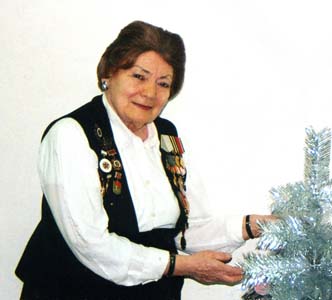 Yevgeniya on the New Year’s Eve in 2005
Yevgeniya on the New Year’s Eve in 2005
After 1918 Ulla started to expand rapidly. Apart from a new sawmill and a flax-mill, built at that time, a strategic airport and a new bridge across the Western Dvina were built in the 30’s. A tannery, located on the river bank was burnt in a fire somewhere around that time. In the center of Ulla there was a blacksmith shop and a big square, where locals organized trade fairs, selling vegetables, fruit and berries, as well as chickens, calves, cows and horses. 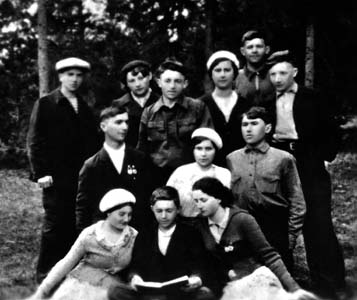 Yevgeniya’s sisters: Hanna and Shifra
Yevgeniya’s sisters: Hanna and Shifra(bottom row, the last on the left and upper row, the second on the left – both in berets) and brother Bentzi (the last on the right in the upper row) in Ulla with their friends, photo dating from 1938-1939. Ulla was a multinational settlement – Belarusians, Jews, Poles and Russians lived there. Our parents, the Rosenblums, moved to Ulla with their first daughter in 1918. My grandparents opened a small grocery shop in Ulla. Then the family started to grow, and my father’s brothers, who had their own children, helped to support us. With their help our parents bought a house and a small yard where we held a cow and a horse. Father was involved in building the new airport, working day and night, my sister helping as well. In Ulla we were friendly with many families, including the Druyans, the Pudels, the Goldyns, the Leibmans, the Yakatzkiyes, the Syniakovs, the Rotkins, the Syskins, the Dodins, the Grigorievs, the Gutkoviches. By 1935 there were seven children in the family. In 1933 the elder sister left for Leningrad to study, I went there in 1935 for the same purpose. The three sisters and two brothers remained at home in Ulla. Events, which took place in Ulla in 1941 and 1942, were genuinely shocking for everyone. A chance brought us to the settlement in 1944 and the remaining locals told us about the tragedy that had taken place there. According to their stories, the Nazis forced all the Jews out of their houses, which were later robbed both by the Nazis and the locals. The grief-stricken people were pushed into an old barn, which was turned into a Jewish ghetto. They were denied food; all of them, including old people, women and children had to do physical work. Our father, together with my elder brother and several other men, was one day sent to do some work. Afterwards, when they were completely exhausted, they were taken to the territory of a pioneer camp and forced to dig a hole. Although the locals were not allowed to watch, one man managed to hide in a bush nearby and became witness to a beastly massacre and execution. The dead bodies were thrown into the hole they had dug; many were thrown while still alive… The raging fascist beasts were laughing… 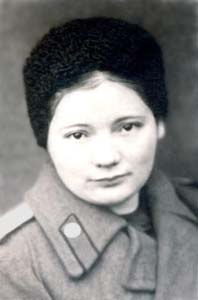 Yevgeniya during the war
Yevgeniya during the warin the uniform. In 1948 my sister and I came back to Ulla, and with the help of two locals, who had a horse, we brought an old tombstone with an inscription in Hebrew from the local Jewish cemetery and set it on the place of the mass grave, which presumably contained 320 bodies. In a couple of hours we managed to set up a small obelisk. More than once we asked the local authorities to help, however, while they were procrastinating, our neighbor Grisha Pudel, whose parents and sister had been buried in the same mass grave, brought specially made tombstones from Leningrad. Then we painted the fence and set up a stele. 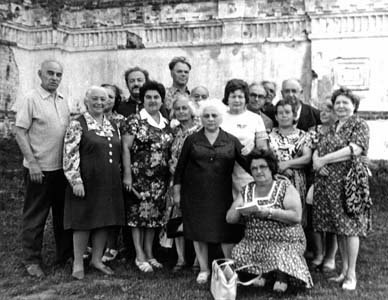 Meeting of locals in Ulla. August 10th, 1979.
Meeting of locals in Ulla. August 10th, 1979.
In 1978 the authorities started reconditioning numerous burial places remaining from the war period, including the ones in Ulla. By 1979 the Ulla graves had been reconditioned. We came to Ulla as often as we could. Last time I visited it with my granddaughter Yulia Ariyevich in 2002. 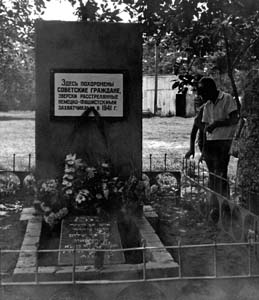
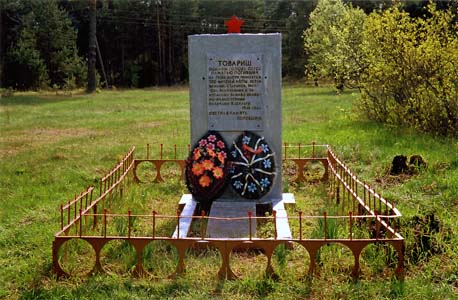 Memorial on the mass grave in Ulla.
Memorial on the mass grave in Ulla.
Lost in the Ulla ghetto: Father – Grigory Rosenblum Mother – Rosaliya Rosenblum Sister – Hanna Rosenblum (born in 1922) Sister – Shifra Rosenblum (born in 1924) Brother – Bentzi Rosenblum (born in 1926) Sister – Ida Rosenblum (born in 1928) Brother – Maks Rosenblum (born in 1935) |
|||
|
|
Jewish settlements in Vitebsk regionVitebsk • Albrehtovo • Babinovichi • Baran • Bayevo • Begoml • Beshenkovichi • Bocheikovo • Bogushevsk • Borkovichi • Braslav • Bychiha • Chashniki • Disna • Dobromysli • Dokshitsy • Druya • Dubrovno • Glubokoye • Gorodok • Kamen • Kohanovo • Kolyshki • Kopys • Krasnopolie • Kublichi • Lepel • Liady • Liozno • Lukoml • Luzhki • Lyntupy • Miory • Obol • Oboltsy • Orsha • Osintorf • Ostrovno • Parafianovo • Plissa • Polotsk • Prozorki • Senno • Sharkovshina • Shumilino • Sirotino • Slaveni• Smolyany • Surazh • Tolochin • Ulla • Verhnedvinsk • Vidzy • Volyntsy • Yanovichi • Yezerishe • Zhary • Ziabki • |
Main |
New publications |
Contacts |
Site map |
Vitebsk region |
Mogilev region |
Minsk region |